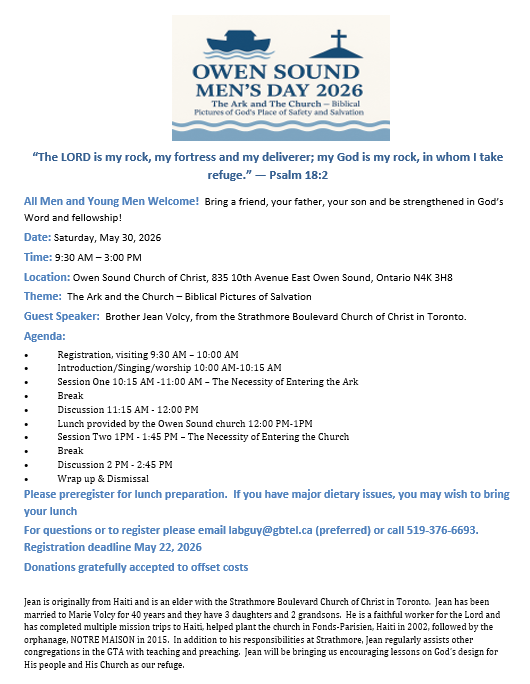Revelation 2:1–7
Letters can be very personal and meaningful. Letters from people we know remind us of important events, thoughts and feelings we share.
So it is encouraging that when God had eternally important things to tell His people in the first century, and for all ages, He chose to put many of them in letters. The large majority of New Testament books are letters. Some of these, like Acts and Revelation, have letters within them.







In Revelation 2 and 3 we have seven personal letters from Jesus Christ by His beloved Apostle John in the Spirit to His seven angels of seven assemblies of His people in the Roman province of Asia. Each one is custom made for its readers.
Though Jesus is the main subject of the New Testament, He didn’t physically write in it, except on the ground in John 8:1–11. He did, however, dictate these seven special letters. In Revelation 1:3 God promises, “Blessed is he who reads and those who hear the words of the prophecy, and heed the things which are written in it; for the time is near.”
Structure & Message
Jesus’ seven letters generally have an eight point structure though not all points are present or necessary in every letter:
1) a salutation, an opening greeting, with instructions and a vision of Jesus related to John’s, writing, vision and meeting with Him in chapter 1, plus a reference to David
2) an encouraging commendation
3) a convicting rebuke
4) correcting commands
5) consequences of not obeying His commands
6) a further positive commendation
7) Jesus’ command to hear what the Spirit says to all His assemblies
8) a beautiful promise of reward for overcomers.
You will notice the important messages contained in each of these elements in Jesus’ first letter to the assembly of His people in Ephesus as you read Revelation 2:1–7,
“To the angel of the assembly in Ephesus write: The One who holds the seven stars in His right hand, the One who walks among the seven golden lampstands, says this: 2 ‘I know your deeds and your toil and perseverance, and that you cannot tolerate evil men, and you put to the test those who call themselves apostles, and they are not, and you found them to be false; 3 and you have perseverance and have endured for My name’s sake, and have not grown weary. 4 But I have this against you, that you have left your first love. 5 Therefore remember from where you have fallen, and repent and do the deeds you did at first; or else I am coming to you and will remove your lampstand out of its place—unless you repent. 6 Yet this you do have, that you hate the deeds of the Nicolaitans, which I also hate. 7 He who has an ear, let him hear what the Spirit says to the churches. To him who overcomes, I will grant to eat of the tree of life which is in the Paradise of God.”
Greeting
In His opening salutation, Jesus refers directly to John’s vision of Him and two of His metaphors, the stars and the lamp-stands, His angels and His assemblies. (You may recall our closer look at these in December 2020, https://gospelherald.org/2103-2/).
Jesus holds each angel (messenger) star in His right hand, a position of power and blessing. Jesus’ is among His assemblies, His golden lamp-stands. He adds for the Ephesians that He is the One who walks among them all. This is an inspiring and sobering thought. Jesus is always among us as our Lord and Head though unseen. He knows what’s going on within us and in the world pressing in around us. We, as golden lampstands, are to hold up the light of Jesus to shine in the world and light up the spheres of our service with Him as the menorah lit up the tabernacle and temple spaces where God’s priests served. John’s vision magnified Jesus, our High Priest. We are His royal priesthood.
Commendation I
In verses 2 and 3 we see nine of Jesus’ ten commendations of the Ephesians in three groups of three: “I know
I. 1) your deeds and 2) your toil and 3) perseverance, and
II. 4) that you cannot tolerate evil men, and 5) you put to the test those who call themselves apostles, and they are not, and 6) you found them to be false; and
III. 7) you have perseverance and 8) have endured for My name’s sake, and 9) have not grown weary.”
We should admire, and aspire to, all of these!
Conviction
In verse 4 we have Jesus’ conviction and rebuke of this hard working congregation. With all their diligent labour and guts to stand up for the truth against evil men and liars, it’s hard to imagine how any human could find fault. Wouldn’t 9 out of 10 be good enough? But Jesus knows everyone’s hearts and He aims for perfection. He says, “But I have this against you, that you have left your first love.”
Jesus’ word for left is aphiemi, which in this context means to move away, cause a separation, leave, depart, give up, abandon, let go like a ship’s ropes from its mooring. His word for first, protos, proton, indicates what is first in a series in time and space, in a sequence or set of things, in essence, what is first above all, the earliest deep love of God they experienced by His grace.
How can we know what exactly is “your first love” for the Ephesians in their first century world? We are fortunate to have great sources in Acts 18, 19 and 20, Paul’s letter to the Ephesians and his first letter to Timothy. Together these tell us about their love over the approximately ten year period from about AD 53 to 63. They saw Paul’s passion for God and for them and how hard he worked to show love in practical terms. He commends them for “your love for all the holy ones” (Ephesians 1:15b).
Love, agape, for them includes all of 1) the love of God, 2) the love of neighbour and 3) the love of one another (John 13:34). It is love without limits, warm heartfelt regard and keen interest in others, seeking their good above one’s own, the very core of who God is as John earlier wrote in His first letter, “God is love” (1 John 4:8b, 16b). It is the love that is first among God’s great commandments and the fruit of His Spirit.
Over the forty years from the beginning of Paul’s time with them to receiving Jesus’ Revelation letter, the Ephesians had continued strong in the battle of truth. They were speaking and standing for the truth but their love had taken a beating. They needed renewal of their love. In the fourth part of His letter, Jesus gives them three correcting commands, important steps on the way back to their first love: 1) remember, 2) repent, 3) do…
Commands: Remember, Repent, Do
“Therefore remember from where you have fallen” (2:5). Remembering involves recalling what we know. The Ephesians had fallen from a height of love they knew. They needed to recall it and get back up there to the riches of God’s love and their inheritance in His heavenly places. They needed to keep God and these eternal blessings foremost in their minds while they continued in the war for truth.
“Repent and do the deeds you did at first!” (2:5). Jesus opened His ministry as John the Baptist did with the words, “Repent for the kingdom of the heavens is at hand” (Matthew 3:2; 4:17). Jesus’ word for repent is another function of the mind closely linked with remembering. Metanoya is a compound of “with” and “mind,” to change with thinking. Paul taught the Ephesians “repentance toward God.” Repentance is a turning to God directed by the mind and the will. Repentance is a key step in first knowing God and establishing and then maintaining a relationship with Him as we constantly correct our focus to be fixed on Him.
There is a beautiful parallel to Jesus’ commandments to remember, repent and do in the faith, grace and works of which Paul wrote to the Ephesians about in Ephesians 2:10–11. “For by grace you have been saved through faith; and that not of yourselves, it is the gift of God; 9 not as a result of works, so that no one may boast. 10 For we are His workmanship, created in Christ Jesus for good works, which God prepared beforehand so that we would walk in them.” God’s grace ignites our first experiences of His love. This leads us to repentant faith because of His overwhelming goodness to us demonstrated in Jesus’ death, burial and resurrection for our forgiveness and justification. In response to all He has done for us we show our love in return by doing the works He has prepared for us to walk in.
Consequences
Jesus provided further motivation by giving the Ephesians clear consequences and reemphasising repentance, “or else I am coming to you and will remove your lampstand out of its place—unless you repent”(2:5). Since their lampstand is their congregation that is to hold forth Jesus the Light of the World, the consequences of not remembering, repenting and doing are a total loss of their eternal status in God’s grace in Christ.
Commendation II
Jesus returns to another positive commendation in verse 6, “Yet this you do have, that you hate the deeds of the Nicolaitans, which I also hate.” Little is known of this group which some connect with Nicolas the deacon (Acts 6:5 ) but we do learn in Jesus’ third letter to Pergamum there is a connection to Balaam, idolatry and immorality (2:14–15). The Ephesians hated these like Jesus hated them.
Command to Hear
Jesus encourages them to hear everything He has said, in verse 7, “He who has an ear, let him hear what the Spirit says to the assemblies.”
Jesus’ Promise of Reward
Finally, Jesus gives this beautiful promise, “‘To him who overcomes, I will grant to eat of the Tree of Life which is in the Paradise of God’”(2:7). The ones overcoming are the victorious ones, from the word family of victory, nike. Victory is the opposite of giving up and abandoning their first love.
Profoundly, this is the first mention of TheTree of Life since thousands of years earlier when God closed access to it when He removed Adam and Eve from the Garden of Eden in Genesis 3. All His overcomers have free access to it in the new heaven, the new earth and the new Jerusalem in Revelation 22.
The Ephesians reading, hearing and doing Jesus’ commands would find that opening and reading His letter is eternally rewarding. When we in our day open and read Jesus’ letter to the Ephesians we see its encouraging words, strong honest critique and instructions on how to correct our course to return to our first love: remember… repent… do…
You can read more, and see pictures, on the important context of Jesus’ people in Ephesus here: https://app.box.com/s/k7fmo453emievy3kpvtlo7pjdrirzzto

